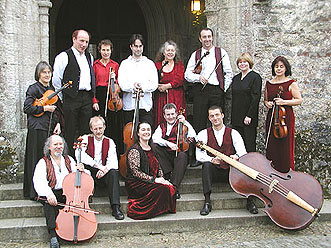Other Links
Editorial Board
- Editor - Bill Kenny
- London Editor-Melanie Eskenazi
- Founder - Len Mullenger
Google Site Search
SEEN
AND HEARD CONCERT REVIEW
Natalie Clifton-Griffiths (Soprano)

Devon Baroque
Owen Willetts (Alto)
Richard Rowntree (Tenor)
Stephen Foulkes (Bass)
A Messiah performed to
perfection by (mostly) west country artists, brought a truly
festive feeling to Exeter's splendid cathedral this week;
especially so, as it featured Devon Baroque, the
county's only professional orchestra.
What more could a Devon man want at Christmas?
Formed by the incomparable Margaret Faultless, co-leader of the Orchestra
of the Age of Enlightenment
and a respected international artist of great
technical skill and scholarship, Devon Baroque has redrawn the
south west's musical landscape in recent years. The
group uses period instruments and in true baroque tradition varies
in size and composition to fit its repertoire. Here, a harpsichord
and a ringing baroque trumpet filled out the string and woodwinds' glorious
sound.
Other west country connections were added by the fact that
conductor Rupert Gough was Assistant Organist at Wells Cathedral
for eleven years before becoming Director of Choral Music at
London University's Royal Holloway College; where the mixed voice Chapel
Choir sings a daily morning service and Sunday
Evensong. Bass soloist Stephen Foulkes is a vicar-choral at
Wells Cathedral too and the Sheldon Consort - supplementing
the Royal Holloway voices - began as the Wells Chamber Choir.
The
soprano soloist was born in Cornwall.
This was essentially a small scale, light-touch Messiah although with more than
enough power to fill the Cathedral's vast spaces. Taken along
at
a distinctly sprightly pace, the young choristers - about
thirty all told - tackled Handel's familiar but oddly tricky score
with great accuracy, excellent ensemble and impeccable tuning. The
music was performed without repeats in the main, which
added nicely to the sense of pace and timing, all of which felt entirely
appropriate. This was a refreshingly
joyful and celebratory account of the work completely suited to the
Christmas season. The solemn Easter sections were
not neglected however and all the drama of the work was
revealed with great care and affection.
The Baroque ornamentation used by all the soloists was also wholly
appropriate - at least to my ear - never once over-florid or
desperately 'authentic', as seems so often the case these
days. Soprano Natalie Clifton-Griffiths has a sweet,
lyrical and vibrato free voice which was perfectly matched to 'How
beautiful are the feet of them that preach the gospel of peace'
and 'I know that my Redeemer liveth' in Parts II and
III but was equally well suited to the jaunty runs of 'Rejoice
greatly, O Daughter of Zion' in the oratorio's opening section:
and how nice it was to hear that done in compound time
for once. Her four recitatives after the Pifa were
genuinely elegant, moving the the story on quickly but with graceful clarity toward the climactic moment of the angels'
triumphant chorus
'Glory to God.'
Richard Rowntree sang fluid yet manly versions of the tenor arias
with especially fine ringing sounds in 'Thou shalt break them with
a rod of iron,' while bass-baritone
Stephen Foulkes was more than equal to the demanding dynamic range
and vocal compass of his arias, producing a solid low F in 'The
people that walked in darkness.'
The discovery of the evening however, was Owen Willetts'
alto singing. His is a voice of considerable beauty and power,
completely untroubled by problems of
passaggio, and sounding unforced and effortless
throughout its considerable dynamic range. While all four soloists
were more than pleasurable to hear, Owen Willetts' contributions
will stay longest in the memory, certainly in this kind of
repertoire. He will prepare a role in a very different style
when he covers as The Innocent in
Harrison Birtwistle's new opera, The Minotaur,
at The Royal Opera next year which should surely be interesting
to hear.
Such superlatives spring to the fingers when thinking about
Devon Baroque that it's hard not sound uncritical. Writing
about the
Mellstock Band last week though, I said that their Christmas
Music was as significant (in its own way) as the King's College
Nine Lessons and Carols or a very good Christmas Messiah.
The Messiah
I had in
mind fortuitously turned up as this one.
Merry Christmas to all involved in it -
especially Rupert Gough and Margaret Faultless.
Bill Kenny
The Devon Baroque web site is
HERE
A longer feature on the work of Devon Baroque will appear in the
New Year.
